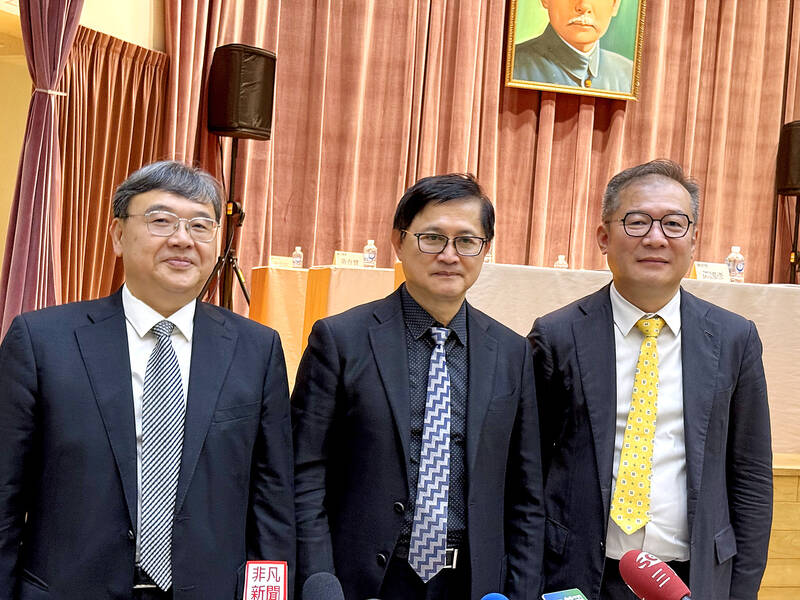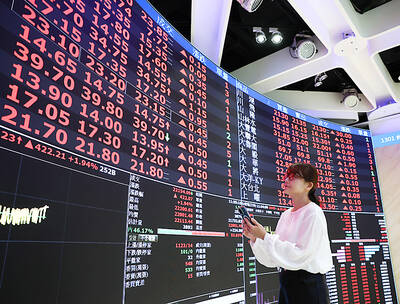Electronics manufacturer Pegatron Corp (和碩) yesterday said it is considering setting up a new server plant in the US to cope with rising demand for artificial intelligence (AI) servers in North America and to mitigate the impact of US tariffs.
The company, one of Apple Inc’s iPhone assemblers, has diversified into the server business in the past two years and is forecasting growing server shipments in the second half of this year over the first half, Pegatron cochief executive officer Gary Cheng (鄭光志) told reporters after the company’s annual shareholders’ meeting.
In response to such an increase in demand, Pegtron is considering setting up new factories in North America, Cheng said.

Photo: CNA
“When we talk about setting up North American bases, we are not limiting those manufacturing sites to Mexico. The US would be included as well,” Cheng said.
Asked whether Texas is on the company’s short list to build a new factory, Cheng said the company would make a decision later this month at the earliest.
The plan would be subject to the approval of the board of directors, he said.
Pegatron is weighing several factors when deciding the matter, including land availability, electricity rates and labor costs, he added.
Pegatron set up a manufacturing base in Mexico last year, with mass production of servers expected to begin in the third quarter, Cheng said.
“We are considering how to access electricity in the shortest time and at the lowest cost, and would not choose a remote location — likely somewhere where many of our peers have already set up factories,” he said.
The outlook for the server business in the second half of this year remains conservative, given tariff uncertainties and the front-loading effect in the first half, Cheng said.
Many clients have requested early shipments to the US after US President Donald Trump unveiled a 90-day pause of his “reciprocal” tariffs on April 2, leading to stronger-than-expected server shipments in the first half, he said.
Aside from its AI server product lines, Pegatron has also expanded into the electric vehicle market in collaboration with chipmaker NXP Semiconductors NV, Cheng said.
The company expects to launch new products with an automaker by the end of this year at the earliest, he said.
Pegatron supplies onboard computers, engine-control units and charging piles.
In response to a question about the impact of the sharp appreciation of the New Taiwan dollar, cochief executive officer Johnson Teng (鄧國彥) said the company has implemented hedging rules, given that a majority of its payments and revenues are in US dollars.
Pegatron shareholders approved a cash dividend of NT$4.5 per share, the highest since 2022. That represented a payout ratio of 70.97 percent based on the company’s earnings per share of NT$6.34 last year.

UNCERTAINTIES: Exports surged 34.1% and private investment grew 7.03% to outpace expectations in the first half, although US tariffs could stall momentum The Chung-Hua Institution for Economic Research (CIER, 中華經濟研究院) yesterday raised its GDP growth forecast to 3.05 percent this year on a robust first-half performance, but warned that US tariff threats and external uncertainty could stall momentum in the second half of the year. “The first half proved exceptionally strong, allowing room for optimism,” CIER president Lien Hsien-ming (連賢明) said. “But the growth momentum may slow moving forward due to US tariffs.” The tariff threat poses definite downside risks, although the scale of the impact remains unclear given the unpredictability of US President Donald Trump’s policies, Lien said. Despite the headwinds, Taiwan is likely

READY TO BUY: Shortly after Nvidia announced the approval, Chinese firms scrambled to order the H20 GPUs, which the company must send to the US government for approval Nvidia Corp chief executive officer Jensen Huang (黃仁勳) late on Monday said the technology giant has won approval from US President Donald Trump’s administration to sell its advanced H20 graphics processing units (GPUs) used to develop artificial intelligence (AI) to China. The news came in a company blog post late on Monday and Huang also spoke about the coup on China’s state-run China Global Television Network in remarks shown on X. “The US government has assured Nvidia that licenses will be granted, and Nvidia hopes to start deliveries soon,” the post said. “Today, I’m announcing that the US government has approved for us

When Lika Megreladze was a child, life in her native western Georgian region of Guria revolved around tea. Her mother worked for decades as a scientist at the Soviet Union’s Institute of Tea and Subtropical Crops in the village of Anaseuli, Georgia, perfecting cultivation methods for a Georgian tea industry that supplied the bulk of the vast communist state’s brews. “When I was a child, this was only my mum’s workplace. Only later I realized that it was something big,” she said. Now, the institute lies abandoned. Yellowed papers are strewn around its decaying corridors, and a statue of Soviet founder Vladimir Lenin

The National Stabilization Fund (NSF, 國安基金) is to continue supporting local shares, as uncertainties in international politics and the economy could affect Taiwanese industries’ global deployment and corporate profits, as well as affect stock movement and investor confidence, the Ministry of Finance said in a statement yesterday. The NT$500 billion (US$17.1 billion) fund would remain active in the stock market as the US’ tariff measures have not yet been fully finalized, which would drive international capital flows and global supply chain restructuring, the ministry said after the a meeting of the fund’s steering committee. Along with ongoing geopolitical risks and an unfavorable